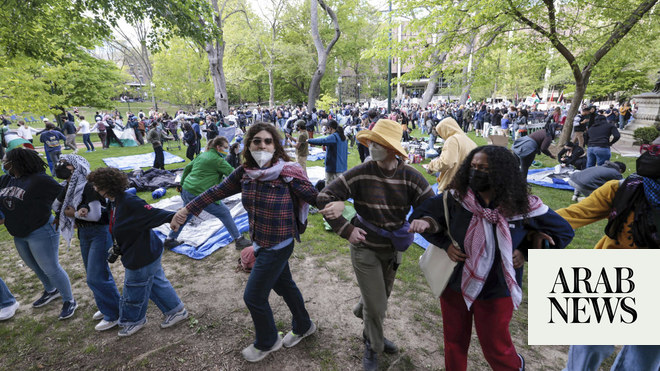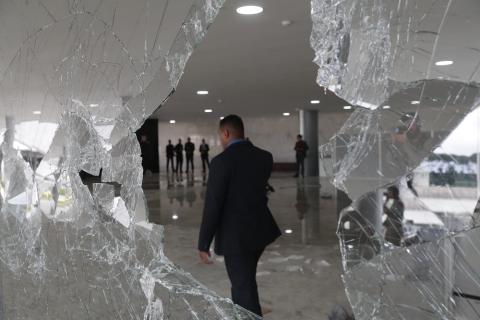
The far-right storming of Brazil’s supreme court, congress and presidential palace was a “grotesque and failed assault” on its institutions, said the country’s ambassador to the UK, as troops moved in to break up protest camps set up by supporters of the former president Jair Bolsonaro.
A day after the would-be insurrectionists attacked all three branches of government in a brazen effort to topple the democratically elected government of Luiz Inácio Lula da Silva, Fred Arruda, Brazil’s ambassador in London told the Guardian: “What happened in Brasília yesterday was a grotesque and failed assault on our institutions. As President Lula put it, democracy requires people to respect the institutions.”
He warned that members of the mob would feel the full force of the law, adding: “And they will witness an unintended consequence of their actions: Brazilian democracy emerging even stronger from those dark episodes,” he said.
The justice minister, Flávio Dino, said that around 1500 had been arrested during and after the unrest, said police had started tracking those who paid for dozens of buses that transported protesters. Forensic evidence including fingerprints and photographs would be used to hold people to account, he said.
“They will not succeed in destroying Brazilian democracy. We need to say that fully, with all firmness and conviction,” Dino said. “We will not accept criminal methods to carry out political fights in Brazil.”
Bolsonaro lost to Luiz Inácio Lula da Silva in a tight-fought election in October but his supporters have refused to accept the result and camped out near military facilities, alleging the election was stolen, even though there is no evidence to back up their claim.
A significant number have appealed for the military to overthrow the elected government and thousands of them marched on the capital on Sunday, storming into the presidential palace, the congress building, and the supreme court.
They smashed windows, furniture and equipment, destroyed works of art and official documents, and occupied the buildings before law enforcement officials moved in to end the chaos. At least 1,200 people were arrested, according to the Folha de S Paulo newspaper.
The lawlessness was condemned by politicians, world leaders and most Brazilians. After a phone call on Monday, Lula and the US president released a joint statement, saying that “[Joe] Biden conveyed the unwavering support of the United States for Brazil’s democracy and for the free will of the Brazilian people as expressed in Brazil’s recent presidential election, which President Lula won. President Biden condemned the violence and the attack on democratic institutions and on the peaceful transfer of power.”
But hardcore Bolsonaro fanatics – described by Lula as “vandals and neo-fascists” – were unbowed on Monday morning.
“He’s a corrupt thief,” Carla Coutinho, said of Lula as she looked on from her makeshift camp outside the army’s cultural centre.
The mood was tense as riot police carrying shields and truncheons started to clear the camp. Some radicals had fled after Sunday’s chaos and soldiers removed what remained, leaving scores of tents and plastic sheeting blowing in the wind.
Brazil flags and placards fluttered in the trees and blew along the ground, beside pallets and other debris. Some stragglers hauled backpacks away under the watchful eye of troops.
Later on Monday, left-leaning organisations in cities including São Paulo and Rio de Janeiro marched in support of Lula and democracy.
Persistent rain did not deter pro-democracy demonstrators who gathered in central Rio, demanding that the perpetrators be held to account with the chant: “No amnesty!”
“Brazil is a peaceful country. As a leftwing, progressive activist, I’ve lost several elections, and that’s part of democracy. But yesterday, I was terrified, I was scared of what might happen,” said Claudia Menezes Vitalino, 52, a historian and civil servant.
Dancer Gabriela Haddad, 29, said she felt anger and indignation towards the Bolsonaro supporters whom she described as carrying out “terrorist acts”.
“We must show that they are not the majority, that there is a big segment of the population that is completely against these sorts of anti-democratic acts,” she said.
Leaders of all three branches of government issued a joint statement expressing their united front against the threats to the democratic order.
“We call on society to remain calm in defence of peace and democracy,” the letter said. “The country needs normality, respect and social justice.”
Lula was in São Paulo overseeing flood relief at the time of the insurrection but returned to the capital on Sunday night after ordering federal officials to assume control of public security decisions in Brasília.
He promised to use the full force of the law to bring those responsible to justice, as well as those who financed the camps and their occupants.
The justice ministry set up an anonymous email to receive “information about the terrorists who invaded and destroyed” government buildings and independent sources set up image searches to identify those who appeared on camera.
Around the same time, Anderson Torres, the Federal District’s police chief, was relieved of his duties and shortly afterwards, the capital’s governor was also removed.
The supreme court justice Alexandre de Moraes said Governor Ibaneis Rocha had ignored requests from federal authorities to prepare an appropriate security plan ahead of Sunday’s protests. The pro-Bolsonaro governor had also defended what he called “free political manifestations”, Moraes said.
“Absolutely nothing justifies the omission and connivance of the Federal District’s public security secretary and the Federal District’s governor with the criminals who announced ahead of time that they were going to practice violent acts,” Moraes said in a statement.
Bolsonaro criticised what he called the “depredations and invasions” but in keeping with his strategy since losing the election he did not unequivocally ask his supporters to stop their protests.
The former president fled to the United States on the eve of Lula’s inauguration and with US leaders vocally supporting Lula, intrigue mounted over his status there.
The O Globo columnist Guga Chacra suggested that Bolsonaro, who arrived in Florida while still president, may have done so on a diplomatic passport.
However, after leaving power on 1 January he could be considered a tourist and so might need to change his visa status.
On Tuesday the former leader was reported to have been admitted to a hospital in Florida after complaining of stomach pains.












